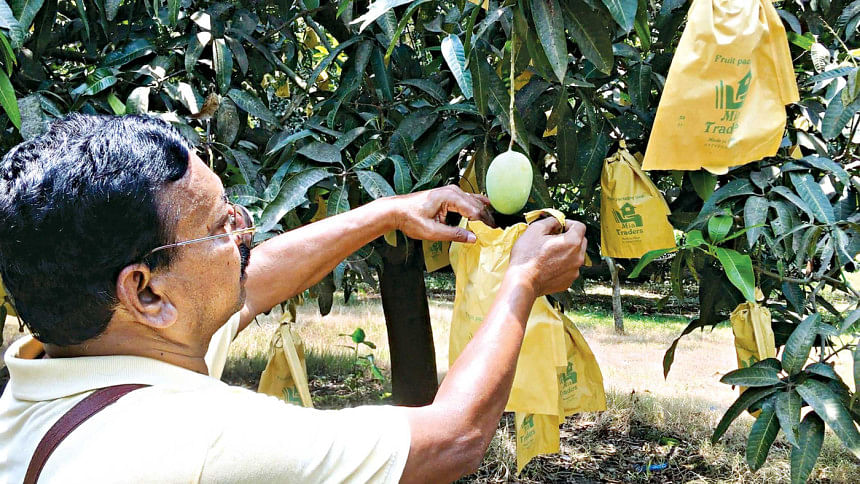Fruit bags promise high quality mangoes

The special method of growing mangoes inside multi-layered bags with wax on the outer surface may not pose any potential health hazards for end consumers, but the additional cost makes the fruit costlier, according to market players.
However, this surefire method of producing quality fruits is expanding among the country's mango producers with its allure of higher profits in exchange of increased input costs.
"Unlike traditional mango growers, fruits produced using this technique are guaranteed to reach the market barring any unforeseeable circumstance during transport," said Dr Sorof Uddin, an agriculturist.
This is because other than protecting from pest attacks, the bags help defend against gales, torrential rain and even hailstorms with their ability to withstand wind speeds of up to 65 kilometres per hour before being blown away.
In addition, the bags help keep the mangoes dry inside a controlled temperature, which extends the fruit's longevity so that farmers can take them to the market at will.
The demand for fruit bags in mango farming has been increasing by about 1 crore to 1.5 crore pieces per year, according to industry experts.
When they were first introduced back in 2016, some 60,000 bags were used. This year though, at least 12 crore fruit bags were used for growing mangoes, they said.
Mango farmers in Chapainawabganj account for a majority of the bags being used with about 10 crore of them spread throughout orchards in the region while Naogaon, Rajshahi and other top mango producing districts are utilising the rest.
In the Jinnahnagar area of Rajshahi city, this correspondent saw brown fruit bags were covering mangos in an orchard owned by Anwarul Hoque, president of the Rajshahi Safe Agro Food Producers' Society.

Hoque said he used a total one lakh bags this year and was expecting more than 20 tonnes of export quality mangoes.
Fruit bags involve an additional cost of Tk 1,000 per maund (40 kilogrammes) of mangoes as each bag costs Tk 4 while the associated labour cost of applying them is Tk 5.
While normal mangoes sell at Tk 1,800, Hoque can sell his bagged mangoes at Tk 3,200 per maund due to their superior quality.
"You just can't avoid making a profit after using fruit bags on mangoes," he said.
Asked about the availability of buyers for such costly fruit, Hoque said he has some 200 buyers who are health-conscious and procure mangoes only from him because of better quality.
"Some exporters also collect my mangoes," he said, adding that about 20 tonnes of his fruit travels to some eight countries each year.
The use of fruit bags on mangoes is increasing but steady export growth would have helped expedite the method's use further, said agriculturist Uddin.
However, most locals are still not buying the mangoes at such costly prices, he added.
At present, only medium and large farms are using fruit bags as small farms remain unable fund such an expense.
Fruit bags are used during the months of April and May, just ahead of the paddy harvest.
As such, small farms reeling from a fund crunch at this time cannot buy the bags, growers and researchers said.
Farmers say the price of fruit bags would have been bearable for small farmers if the 63 per cent import duties levied on them were lessened by considering them as agricultural inputs.
This year, mango yields dropped for bad weather but fruit bagging helped farmers ensure high prices for their produce, said Omor Farul Tipu, general secretary of the Kansat Mango Hoarders Cooperative Association.
"So, there is no reason to be unhappy with this year's low production," he added.
Growers in the district produced at least 20,000 tonnes of export quality mangoes using fruit bags this year.
Some of these mangoes will be exported to different countries while super shops and other retailers of different districts will collect the rest at high prices.
"Though this year's production volume is lower than before, we are not unhappy as we are getting better prices," Tipu said.

 For all latest news, follow The Daily Star's Google News channel.
For all latest news, follow The Daily Star's Google News channel. 



Comments